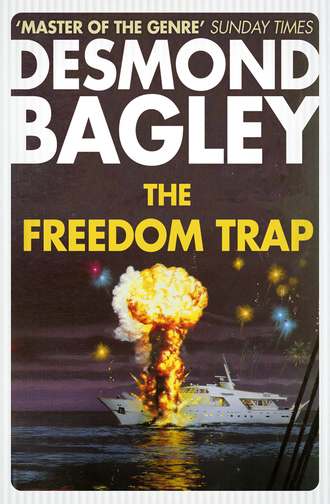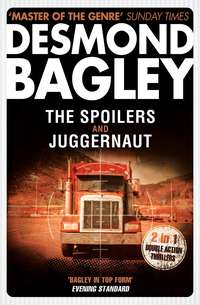
Полная версия
The Freedom Trap
Rollins: But not so speedily.
Brunskill: Perhaps not.
Rollins: Would you not characterize your mysterious communicant as someone who ‘had it in’ for the accused at worst – or a common informer or stool pigeon at best?
Brunskill: (smiling) I would prefer to think of him as a public-spirited citizen.
Very funny! Mackintosh – a public-spirited citizen! But, by God, the pair of them had been infernally clever. The first time I had laid eyes on that picnic basket had been in the Kiddykars office, and I certainly hadn’t telephoned Fortnum’s. Mrs Smith had done her shopping to good effect! Nor did I own Kiddykars Ltd – not to my own knowledge; but I’d have a hell of a time proving it. They had delivered me to the law trussed up like a chicken.
There wasn’t much after that. I said my piece, futile though it was; the prosecutor tore me into shreds and Rollins half-heartedly tried to sew up the pieces again without much success. The judge summed up and, with one careful eye on the Appeal Court, directed the jury to find me guilty. They were out only for half an hour – just time enough for a much-needed smoke – and the answer was predictable.
Then the judge asked if I had anything to say, so I spoke up with just two words: ‘I’m innocent.’
Nobody took much notice of that – they were too busy watching the judge arrange his papers and gleefully anticipating how heavy he’d be. He fussed around for a while, making sure that all attention would be on him, and then he began to speak in portentous and doomladen tones.
‘Joseph Aloysius Rearden, you have been found guilty of stealing by force diamonds to the value of £173,000. It falls to me to sentence you for this crime. Before I do so I would like to say a few words concerning your part in this affair.’
I could see what was coming. The old boy couldn’t resist the chance of pontificating – it’s easy from a safe seat.
‘An Englishman is walking the streets in the course of his usual employ when he is suddenly and unexpectedly assaulted – brutally assaulted. He is not aware that he is carrying valuables which, to him, would undoubtedly represent untold wealth, and it is because of these valuables that he is attacked.
‘The valuables – the diamonds – are now missing and you, Rearden, have not seen fit to co-operate with the police in their recovery in spite of the fact that you must have known that the court would be inclined to leniency had you done so. Therefore, you cannot expect leniency of this court.
‘I have been rather puzzled by your recalcitrant attitude but my puzzlement abated when I made an elementary mathematical calculation. In the normal course of events such a crime as yours, a crime of violence such as is abhorrent in this country, coupled with the loss to the community of property worth £173,000, would be punished by the heavy sentence of fourteen years’ imprisonment. My calculation, however, informs me that for those fourteen years you would be receiving an annual income of not less than £12,350 – tax free – being the amount you have stolen divided by fourteen. This, I might add, is considerably more than the stipend of one of Her Majesty’s Judges, such as myself – a fact which can be ascertained by anyone who cares to consult Whitaker’s Almanack.
‘Whether it can be considered that the loss of fourteen years of freedom, and confinement to the hardly pleasant environs of our prisons, is worth such an annual sum is a debatable matter. You evidently think it is worthwhile. Now, it is not the function of this court to make the fees of crime worthwhile, so you can hardly blame me for endeavouring to reduce your annual prison income.
‘Joseph Aloysius Rearden, I sentence you to twenty years’ detention in such prison or prisons as the appropriate authority deems fit.’
I’d bet Mackintosh was laughing fit to bust a gut.
III
The judge was right when he referred to ‘the hardly pleasant environs of our prisons’. The one in which I found myself was pretty deadly. The reception block was crowded – the judges must have been working overtime that day – and there was a lot of waiting about apparently pointlessly. I was feeling a bit miserable; no one can stand in front of a judge and receive a twenty-year sentence with complete equanimity.
Twenty years!
I was thirty-four years old. I’d be fifty-four when I came out; perhaps a bit less if I could persuade them I was a good boy, but that would be bloody difficult in view of what the judge had said. Any Review Board I appeared before would read a transcript of the trial and the judge’s remarks would hit them like a hammer.
Twenty long years!
I stood by apathetically while the police escort read out the details of my case to the receiving officer. ‘All right,’ said the receiving officer. He signed his name in a book and tore out a sheet. ‘Here’s the body receipt.’
So help me – that’s what he said. ‘Body receipt.’ When you’re in prison you cease to be a man; you’re a body, a zombie, a walking statistic. You’re something to be pushed around like the GPO pushed around that little yellow box containing the diamonds; you’re a parcel of blood and guts that needs feeding at regular intervals, and you’re assumed not to have any brains at all.
‘Come on, you,’ said the receiving officer. ‘In here.’ He unlocked a door and stood aside while I walked in. The door slammed behind me and I heard the click of the lock. It was a crowded room filled with men of all types, judging by their clothing. There was everything from blue jeans to a bowler and striped trousers. Nobody was talking – they just stood around and examined the floor minutely as though it was of immense importance. I suppose they all felt like me; they’d had the wind knocked out of them.
We waited in that room for a long time, wondering what was going to happen. Perhaps some of us knew, having been there before. But this was my first time in an English gaol and I felt apprehensive. Maskell’s words about the unpleasant circumstances that attend the high-risk prisoner began to worry me.
At last they began to take us out, one at a time and in strict alphabetical order. Rearden comes a long way down the alphabet so I had to wait longer than most, but my turn came and a warder took me down a passage and into an office.
A prisoner is never asked to sit down. I stood before that desk and answered questions while a prison officer took down the answers like the recording angel. He took down my name, birthplace, father’s name, mother’s maiden name, my age, next-of-kin, occupation. All that time he never looked at me once; to him I wasn’t a man, I was a statistics container – he pressed a button and the statistics poured out.
They told me to empty my pockets and the contents were dumped on to the desk and meticulously recorded before being put into a canvas bag. Then my fingerprints were taken. I looked around for something with which to wipe off the ink but there was nothing. I soon found out why. A warder marched me away and into a hot, steamy room where I was told to strip. It was there I lost my clothes. I wouldn’t see them again for twenty years and I’d be damned lucky if they’d be in fashion.
After the bath, which wasn’t bad, I dressed in the prison clothing – the man in the grey flannel suit. But the cut was terrible and I’d rather have gone to Mackintosh’s tailor.
A march up another corridor led to a medical examination, a bit of bureaucratic stupidity. Why they can’t have a medical examination while a man is stripped after his bath is beyond me. However, I undressed obligingly and dressed again, and was graded for labour. I was top class – fit for anything.
Then a warder took me away again into an immense hall with tiers of cells lining the walls and with iron stairs like fire escapes. ‘I’ll tell you once,’ said the warder. ‘This is “C” Hall.’
We clanked up some stairs and along a landing and he stopped before a cell and unlocked it. ‘This is yours.’
I went inside and the door slammed with a cold sound of finality. I stood for some time, not looking at anything in particular. My brain had seized up – gone on strike. After, maybe, fifteen minutes I lay on the bed and damn near cried my eyes out.
After that I felt better and was able to bring some intelligence to bear on the situation. The cell was about twelve feet by seven, and perhaps eight feet high. The walls were distempered – institutional cream and Borstal green – and in one of them was a small barred window set high. The door looked as though it could withstand artillery fire and there was a Judas hole set in it.
The furnishing was sparse; an iron-framed bed, a wooden table and a chair, a washstand with jug, basin and chamberpot, and a bare shelf. Exploring a prison cell is one of the quickest tasks a man can set himself. Within three minutes I had checked everything there was to find – three blankets, two sheets, a lumpy mattress, another shirt, a pair of felt slippers, a thin non-absorbent towel, a spoon and a mug. Hanging on a nail in the wall by a loop of string was a copy of the Rules and Regulations governing HM Prisons together with an informational pamphlet.
Three minutes and I knew practically everything there was to know about that cell. I wondered what I was going to do for the next twenty years. Right there and then I decided I’d have to ration my curiosity – shut down the dampers on thought. There would be too much time and not enough happening, and every new experience would have to be jealously hoarded.
The walls of that prison suddenly had physical meaning. I felt them looming all about me, thick and strong. It was a claustrophobic quarter-hour before the feeling receded and I was able to stop shivering.
I immediately broke my promise about rationing curiosity by beginning to read the informational pamphlet, but that was absolutely necessary. I was a new boy in this school and the sooner I learned the ropes the better. There were too many tricks that could be played on the newcomer by the old hands and I didn’t want to fall for any of them.
It was an interesting compilation of data. I discovered that the spare shirt in the cell was to be used as a night shirt, that lights-out was ten-thirty, that the waking call was six-thirty in the morning, that I was to be issued with a razor blade to be returned after shaving. There were other helpful hints even to the point of finding a way out of prison.
For instance, I could refer my case to the Court of Criminal Appeal and, if that failed, I could apply to the Attorney-General to put the case before the House of Lords. At any time I could petition the Home Secretary and I was permitted to write to my Member of Parliament.
I couldn’t see myself doing any of those things. I wasn’t pally enough with the Home Secretary to enter into any kind of extended correspondence and my Member of Parliament was a shade too far away to do any good – 6,000 miles away.
I read the booklet through and then started on it again from the beginning. I had nothing else to do so I decided to memorize the whole goddamn thing. I was still reading it when the light went out.
IV
The bell clanged and I opened my eyes and was confused until I remembered where I was. I dressed hurriedly and made the bed, then hoisted it up so that it stood on end in a corner of the cell. I sat on the chair and waited. Presently there was a slight metallic sound from the door and I knew someone was watching through the Judas hole.
There was a sharp snap from the lock and the door opened. I stood up and the warder came in. He looked appraisingly around the cell and then fixed me with a hard eye. ‘You’re new here. You’ve been reading that thing, haven’t you?’ He nodded to the booklet on the table.
‘Yes, I have.’
‘Your bed’s in the wrong corner, and the book should be hanging on the wall where you found it. You’ll learn. Take a tip from me; do just what you’re told and you’ll be all right. Now, pick up your chamber-pot and get ready for slopping out.’
‘I haven’t used it,’ I said.
‘It gets slopped out whether you’ve used it or not,’ he said curtly. ‘Remember what I told you – do as you’re told with no arguments. That’s lesson number one.’
I picked up the chamber-pot and followed him on to the landing which was full of men, all lined up and each holding his pot. ‘All right,’ someone shouted. ‘Move along.’
There was mephitic stink in the air. I trudged along and found that I was expected to empty the pot into one sink and wash it in another. I went through the motions and returned to my cell, taking my cues from what the others were doing.
The warder came back. ‘You can eat in your cell if you like. You’ll be served with the others down in the hall, but you can bring your tray up here if you don’t feel like joining the party just yet.’
I didn’t feel like talking to anyone at all right then. I was too busy trying to keep a firm hold on myself. ‘Thanks,’ I said, and heard my voice crack.
He was ironic. ‘Don’t thank me; it’s regulations for new prisoners. And another thing, you’ll be seeing the Governor this morning. A trusty will take you to his office.’
The trusty came just before ten o’clock and I went with him out of ‘C’ Hall. ‘You’re Rearden,’ he said. ‘I’ve heard about you.’
‘Have you?’
‘I’m Simpson.’ He nudged me in the ribs with a sharp elbow. ‘You’re going before the Reception Board. Don’t volunteer anything – that’s my tip.’
‘What happens?’
‘Oh, it’s just the big boys giving you the once-over. The Governor, the Bible-Slapper, the Senior Screw, the Welfare Officer – people like that. The Governor’s not too bad if you keep on the right side of him, but Gawd help you if you don’t. Some of the others’ll try to feed you a load of old cod’s wallop – a crowd of flaming do-gooders. But watch out for Hudson – he’s a right bastard.’
‘Who’s he?’
‘The Chief Screw.’
Simpson took me into a waiting room in which half a dozen other prisoners were sitting. They all looked dispirited. Simpson chuckled. ‘You won’t have to wait your turn, mate. You’re on first; you’re someone special.’
I stared at him. ‘What’s so special about me?’
‘You’ll see. The Governor’ll explain it all very nicely.’
I was about to pursue that a bit further but a warder came into the room. ‘Rearden, come this way. Simpson, get back to “C” Hall.’
There were five men seated around a large table, two of them prison officers in uniform. It’s a funny thing about prison officers – they never take off their caps, not even when sitting in the Governor’s office. Perhaps it’s a tradition of the service. One of the civilians wore a dog-collar, so he’d be Simpson’s Bible-Slapper – the Prison Chaplain.
The military-looking man in the middle spoke up first. ‘Rearden, I’m the Governor of this prison. You are here because you have committed a crime and society has decided that you cannot be allowed to remain at large. How you get on in this prison is your own affair. There are two ways of looking at a prison – as a place of punishment and as a place of rehabilitation. The choice is up to you; we have ample facilities for both modes of operation. Do I make myself clear?’
‘Yes, sir.’
He picked up a paper from the table. ‘It is normally my practice to treat all prisoners alike. However, I have received notification from the Home Office that you are to be treated as a high-risk prisoner and that entails certain restrictive modifications of your treatment here. For instance, you were brought to this office by a Star Class trusted prisoner, that will never happen again. In future, if you have to move about inside the prison you will be escorted by a prison officer. You will also wear coloured patches upon your clothing. I have prepared a list here of all the other restrictions appertaining to a high-risk prisoner which you will study and to which you will conform.’
He handed me the paper and I folded it and put it into my pocket.
He cleared his throat. ‘You must understand, Rearden, that whether you remain in the high-risk category depends entirely upon yourself. The position is reviewed at regular intervals and my recommendations are forwarded to the Home Office. You must also understand that the Home Office is at liberty to disregard my recommendations. The fact that you are a high-risk prisoner is entirely of your own doing, and if there is any way you can convince the police authorities that you are not a risk then I strongly recommend that you do so.’
He meant the diamonds, of course. They still wanted those bloody diamonds. ‘Yes, sir,’ I said woodenly. ‘I’ll try to think of something, sir.’
The Governor turned his head. ‘Anything from you, Padre?’
The chaplain smiled. ‘My name is Clark. I note you claim to have no religion.’
‘That’s right, sir.’
‘I’m not one for pushing religion down a man’s throat,’ said Clark. ‘But do you mind if I come to see you from time to time?’
‘No, sir.’
The Governor said, ‘This is Mr Anderson, our Welfare Officer. He can do a lot for you if you will let him. Any time you want to see him ask your landing officer. Have you anything you would like to ask him now?’
‘Yes, sir. How do I get writing material and books?’
Anderson said easily, ‘The writing materials – pens and paper – you will buy in the canteen shop with money you will earn by doing work in the prison. You will be paid a minimum of one shilling and eightpence a day, but you can improve on that if you choose to. Books you can obtain from the prison library.’
‘Thank you, sir,’ I said. ‘Is it possible to get books from outside?’ I hesitated. ‘I’ll be here for a long time – I want to study. I want to improve myself.’
Anderson started to speak but checked himself and looked at the Governor, who said, ‘Very commendable, but we’ll have to see about that. That will depend upon your general conduct and, as you say, you’ll be here a long time.’ He nodded to the uniformed officer at the end of the table. ‘This is Mr Hudson, the Chief Officer responsible for prison discipline. Have you anything to say, Mr Hudson?’
‘Just one thing, sir,’ said Hudson. He had a hard face and eyes like chips of glass. ‘I don’t like high-risk prisoners, Rearden. They upset prison routine and cause trouble among the other prisoners. Don’t give me any trouble, that’s all. If you do it will be the worse for you.’
I kept my face studiously blank. ‘I understand, sir.’
‘I sincerely hope you do,’ said the Governor. ‘You have a visitor – a police officer from Scotland Yard.’ He signalled to a warder standing by the door. ‘You know where to take him.’
I expected to see Brunskill but it was another detective. ‘Detective-Inspector Forbes,’ he said. ‘Sit down, Rearden.’
I sat down, facing him over the table, and he said pleasantly, ‘I expect the Governor has broken the news that you have been classified as a high risk. Do you know what that means?’
I shook my head. ‘Not really.’
‘You’d better find out,’ Forbes advised. ‘The Governor must have given you a copy of the high-risk rules. I’ll give you five minutes to read it.’
I took the sheet of paper from my pocket and smoothed it out on the table. It was immediately apparent after a cursory reading that life was going to be made quite a bit tougher. The light in my cell was going to be on all night, for one thing. All my clothes, except for shirt and slippers, were to be deposited outside the cell door each night. Any letters I wrote I would have to hand to a prison officer – copies would be made and only photostats would be sent to the ultimate destination, the originals to be filed in the prison. Any conversations with visitors were to be monitored by a prison officer.
I looked up at Forbes. He said, ‘Those are only the rules which concern you directly, of course. There are other things. You’ll be moved from cell to cell without warning; your cell will be searched – and so will you – at a moment’s notice. It will all be very harassing.’
‘And what is it to you?’ I asked.
He shrugged. ‘Nothing really – except that I feel sorry for you. If you weren’t so stupid you could get yourself out of this jam.’
‘Out of this nick?’
‘I’m afraid not,’ he said regretfully. ‘But the Review Board would look upon you very kindly if you co-operated with us.’
‘What sort of co-operation?’
‘Come off it, Rearden,’ he said tiredly. ‘You know what we want. The diamonds, man; the diamonds.’
I looked him in the eye. ‘I’ve never seen any diamonds.’ Which was the exact truth – from the start to the finish of the caper. I never saw the diamonds at all.
‘Look, Rearden; we know you did it, and we’ve proved it conclusively. Why try to act the innocent? My God, man; you’ve been sentenced to a quarter of a lifetime in prison. Do you think you’ll be good for anything when you come out? The judge was right – the game isn’t worth the candle.’
I said, ‘Do I have to sit here and listen to you? Is that part of my punishment?’
‘Not if you don’t want to,’ Forbes said. ‘I don’t understand you, Rearden. I don’t understand why you’re taking all this so calmly. All right, let’s try another tack. How did you know the drop? How did you know where the diamonds were being sent? That’s of some interest, too.’
‘I don’t know anything about it.’
‘You don’t know anything about it,’ he repeated. ‘Do you know – maybe that’s true. You could be telling the truth.’ He leaned back in his chair, opened his mouth and shut it again and stared at me. After a few moments he began to laugh. ‘Oh, no!’ he said. ‘It couldn’t be as simple as that! You couldn’t have been double-crossed, could you, Rearden?’
‘I don’t know what you’re talking about.’
Forbes tapped the table. ‘You arrive in England out of the blue, and four days later you do the snatch. It must have been set up for you – you couldn’t have laid it all on in three days. Then we pick you up and there are no diamonds. So where are they? Obviously, someone else must have them.’
He chuckled. ‘Could it be the same someone who made a telephone call and wrote an anonymous letter? You passed on the diamonds and then got shopped, Rearden. Your brainy pal who planned all this made a patsy of you – isn’t that the truth?’
I sat mute.
‘What!’ he said. ‘Honour among thieves? Don’t be as big a fool as you make out to be. Your friend sold you to the law for a few thousand lousy quid and you’re standing for it.’ He sounded disgusted. ‘Don’t think you’re going to get out of here to go looking for him; it’s not going to be as simple as that. I’m to make recommendations to the Home Office, too, you know; and I’m going to report a total lack of cooperation. And that will mean that you’ll be a high-risk prisoner for a hell of a long time – no matter what the Governor may recommend. You can be a good boy in here – you can be the perfect prisoner – but it will cut no ice with the Review Board after they read my report.’
I said hesitantly, ‘I’ll think about it.’
‘You do that,’ he said forcibly. ‘Any time you want to see me just pass word to the Governor. But don’t try to play the fool with me, Rearden. Don’t waste my time. You give us what we want and we’ll nail your friend for you. We’ll crucify him. And you’ll be off the hook as far as high risk is concerned. What’s more, I’ll see to it personally that the Review Board gives your case every favourable consideration. I can’t do more than that, can I?’
Privately, I doubted if he could do as much. A detective-inspector is pretty small fry at Scotland Yard and if he thought I couldn’t see what he was up to he must have thought I was a dumb bunny. All that Forbes wanted was to clear the case and get a good conduct tick on his card – the man who recovered the unrecoverable. And once he’d done it then I could go to hell as far as he was concerned. I wouldn’t count; I was just another bent villain, and you don’t have to keep promises to crooks. Talk about honour among thieves!









